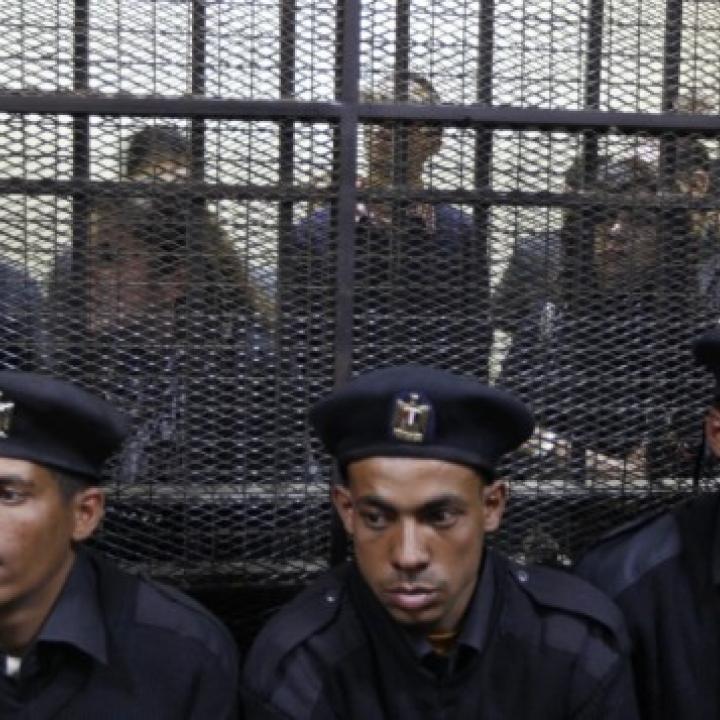

January 12, 2017
At the end of November, Egyptian parliament approved a new law on non-governmental organizations (NGOs), spreading worry in the minds of those interested in Egyptian affairs in general. This law is the latest step toward finishing off rights organizations in Egypt.
In addition to targeting NGO workers and organizations, the law will disrupt Egypt’s social composition. There are many non-political service and development organizations that fall under the NGO umbrella; according to official figures there are more than 46,000 NGOs and only 25 are specifically human rights groups. The rest work in the fields of health, education, and social services.
If ratified by the president, this will be the coup de grace that will finally eliminate NGOs and civil society in Egypt. The law includes toughening the punishment for any administrative violation to imprisonment rather than a fine, as is the current law, which means anyone working in this field is constantly threatened with imprisonment if he makes even a minor administrative error. It also states that the manager of any organization that changes its headquarters without obtaining official permission will be subject to imprisonment of one to five years, in addition to fines of up to half a million Egyptian pounds, equivalent to approximately $55,000 USD. Helping or participating “with a foreign organization in performing a national activity in Egypt without obtaining a permit” or carrying out field research or opinion surveys without obtaining prior approval now carry the same punishment as well.
The law does not stop at shackling NGOs with new regulations, but dries up their financing sources as well — even domestically — by stipulating that they cannot accept monetary donations in excess of 10,000 pounds unless it is by bank check, which is a crippling condition in a country where people do not deal with checks at all. It adds that fundraising in Egypt requires obtaining official permission 30 working days before the fundraiser. So, if there is a disaster and an NGO decided to raise funds for relief to help the victims, they now have to wait a full month before doing so — assuming they can obtain the permit at all.
All NGO operations are now subject to state approval. The legislature formed a new agency to direct this process, entitled the National Regulatory Agency for the Work of Foreign Non-Governmental Organizations. Though concerned primarily with civil society, the agency will include representatives from the Defense Ministry, the Interior Ministry, the Foreign Ministry, the Justice Ministry, the General Intelligence Directorate, the Administrative Control Authority, the International Cooperation Ministry, and the Money Laundering Unit. The agency does not, however, include a single representative from civil society.
As Nasser Amin, a prominent rights lawyer and head of the Arab Center for the Independence of the Judiciary and the Legal Profession, has pointed out, the new law completely contradicts the constitutional text regarding notifications for the formation of NGOs in Egypt. It also failed to take into account the rulings of the Egyptian Constitutional Court, which has consistently chosen not to intervene in the affairs of NGOs, whether related to dissolving the organization, selecting activities, or even determining fields of administrations. The law also violates a number of international conventions to which Egypt is bound, such as the International Covenant on Civil and Political Rights and the Declaration on Human Rights, which explicitly provide for the right of these organizations to work freely and choose the formats through which they will operate.
This is the legal culmination of the ongoing conflict between state and civil society organizations that began after the January revolution during the Supreme Council of the Armed Forces’ (SCAF) rule over Egypt. The first blow to this sector was struck during SCAF’s reign in 2012 in the case known in at the time as “the foreign funding case” during which the prosecutor accused 43 activists, including 19 Americans, of establishing and running international organizations without licenses receiving and accepting foreign funding from abroad in violation of the sovereignty of the Egyptian state. Among the NGOs accused were the International Republican Institute, Freedom House, the American International Center for Journalists, and the Konrad Adenauer Foundation.
When Sisi rose to power it appeared that he would adopt the same line as the SCAF. Thus it was no surprise when the state reopened the case and summoned the most prominent figures in the field of human rights. It quickly issued decisions preventing prominent activists from traveling and then froze the assets of many rights organizations.
In a country like Egypt where the vast majority of citizens are in precarious economic situations, non-governmental organizations and associations play an important role in preserving social stability, which is then strongly reflected by political stability. Overthrowing these organizations, terrorizing them, and forcing them to close down, will leave a huge demand in the needs of hundreds of thousands, if not millions, of Egyptians previously covered by NGOs. How will the state succeed in fulfilling what these groups were committed to doing — especially at a moment when Egypt is undergoing a suffocating economic crisis and shortages of food and medical supplies?
The Egyptian state, in order to silence a handful of human rights groups it found meddlesome, has strangled thousands of groups shouldering the burdens the government could not handle. Ironically, this will cause the very social unrest which the war against the rights organizations was intended, according to the authorities, to guard against.


